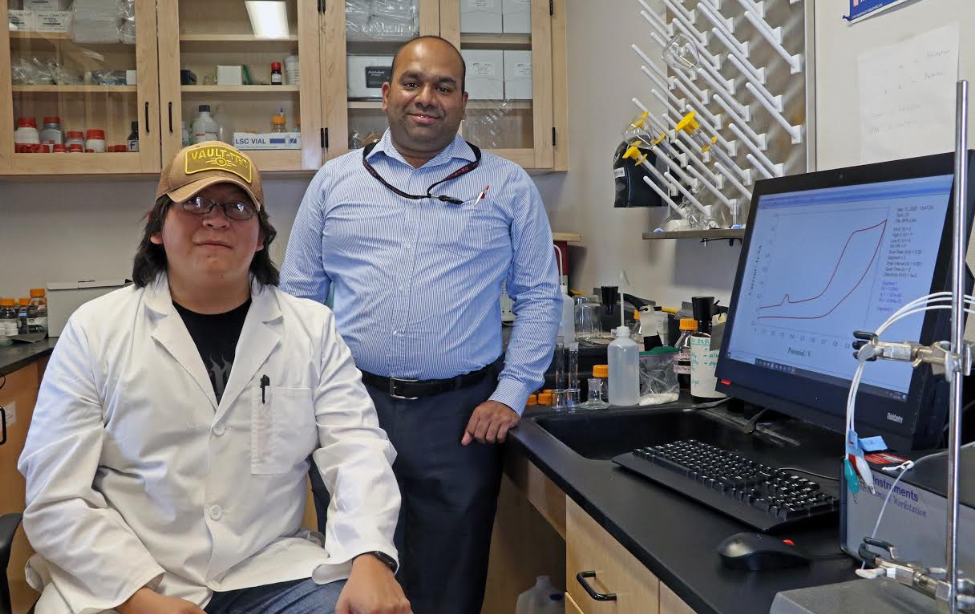
- Details
- By Native News Online Staff
CROWNPOINT, N.M. — The Journal of Power Source, a well-respected journal for researchers and technologists interested in all aspects of science, technology and applications of sources of electrochemical power, has published research by a Navajo Technical University (NTU) associate professor and recent biology graduate.
NTU Associate Professor of Chemistry Dr. Thiagarajan Soundappan and recent biology graduate Robinson Tom were published in the Journal of Power Sources for their research activities related to non-flammable, aqueous gel electrolytes used to produce flexible aqueous lithium-ion batteries.
Their research was conducted over the course of two summers under a faculty and student fellowship with the Army Research Laboratory (ARL) in Adelphi, Md. The research is significant compared to current non-aqueous lithium-ion battery technology and is noteworthy given it was accepted by the Journal of Power Sources, which has an impact factor of 8.247.
“I’m really happy because we learned the new technology for aqueous lithium-ion batteries and our research work is published in a well-recognized journal,” Soundappan said. “Right now we’re a small school. We never had this technology before. We’ll have more publications and patents in the future.”
Soundappan collaborated with the ARL and University of Maryland to conduct the research.
Soundappan and Tom’s research focused on eco-friendly, cost effective methods in making an energy storage system that could be low weight, non-flammable, and worn by soldiers to assist with missions in the battlefield.
The first year of research worked at understanding interfaces within a battery where an electrolyte and electrode comes in contact, while year two took the knowledge gained from year one to test related monomers and crosslinks and their reaction with an aqueous polymer gel electrolyte.
Results from the research showed that the choice of monomers and crosslinks affects the ability of the solution to form a solid gel. Increasing crosslinks allowed for more charge-discharge cycles, which translated to a higher capacity of the battery. It also allowed the battery to perform better at various temperatures, something useful in everyday application.
“It makes me feel proud, especially being a veteran myself,” said Tom, who is a resident of Little Water, N.M. and served in the U.S. Army. “Now I know there are some energy sources that soldiers can use in the battlefield that won’t weigh them down and are less volatile. I feel happy about that, about providing some type of service.”
ARL has a patent on the lithium-ion batteries, including the publication, and NTU is working at transferring the technology to Crownpoint to continue the research and develop a startup company in battery manufacturing on the Navajo Nation. The venture project would require collaboration with NTU’s Innovation Center and other entities, but once in motion, it could serve as a means of economic development much needed in the region.
“We want to get off fossil fuel and use green energy,” Dr. Soundappan stated while describing the possible impact of the project. “By implementing this technology inside [the Navajo Nation], we can fuel job opportunities for our students and the community.”
One student that would benefit from such a venture would be Tom, who has a long-term goal of creating a national laboratory on the Navajo Nation where research could be conducted internally rather than outsourced. He also has aspirations of becoming a faculty member, which he’s on track to do under the American Indian Science and Engineering Society’s Lighting the Pathway fellowship. The fellowship’s aim is to increase the representation of American Indian, Alaska Native, and Native Hawaiians in science, technology, engineering, and mathematics faculty positions at universities across the country.
“Students can know that they can take what they’ve learned at NTU to other areas, and there’s an interest and need,” explained Tom, who works part-time for NTU’s Biology program as a laboratory technician while he explores graduate school opportunities. “It’s not something you have to do elsewhere, it’s something you can do here. When you do research, you contribute to knowledge.”
As a result of tech transfer efforts with ARL, NTU’s wet laboratories have obtained a brand-new, sophisticated battery cycler, which is a vital research and testing instrument of rechargeable batteries. Students have also begun research on battery electrochemistry.
More Stories Like This
Native Americans Could Be Hit Hard as Education Department Resumes Student Loan Wage GarnishmentHanging a Red Dress for Christmas: MMIP, Native Higher Education, and Hope for a Better New Year
Native Students Can Win $5,000 Scholarship, International Distribution in Pendleton Design Contest
American Indian College Fund Raises Alarm Over Plan to Shift Native Programs Away From the Dept. of Education
MacKenzie Scott Foundation Gives $5 Million Contribution to Little Priest Tribal College
Help us defend tribal sovereignty.
At Native News Online, our mission is rooted in telling the stories that strengthen sovereignty and uplift Indigenous voices — not just at year’s end, but every single day.
Because of your generosity last year, we were able to keep our reporters on the ground in tribal communities, at national gatherings and in the halls of Congress — covering the issues that matter most to Indian Country: sovereignty, culture, education, health and economic opportunity.
That support sustained us through a tough year in 2025. Now, as we look to the year ahead, we need your help right now to ensure warrior journalism remains strong — reporting that defends tribal sovereignty, amplifies Native truth, and holds power accountable.
 The stakes couldn't be higher. Your support keeps Native voices heard, Native stories told and Native sovereignty defended.
The stakes couldn't be higher. Your support keeps Native voices heard, Native stories told and Native sovereignty defended.
Stand with Warrior Journalism today.
Levi Rickert (Potawatomi), Editor & Publisher

